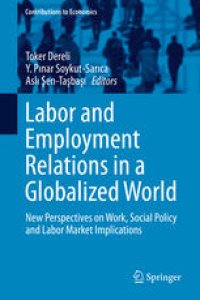
Ebook: Labor and Employment Relations in a Globalized World: New Perspectives on Work, Social Policy and Labor Market Implications
- Tags: Labor Economics, Social Policy, Labour Law/Social Law, Human Resource Management, Emerging Markets/Globalization
- Series: Contributions to Economics
- Year: 2014
- Publisher: Springer International Publishing
- Edition: 1
- Language: English
- pdf
This book explores the new challenges for work and employment relations in the wake of globalization. It describes contemporary developments and ways in which labor relations systems are evolving around the world and in Turkey. Authors combine the latest information with in-depth insights on a variety of issues. The implications of international trade for employment, the dichotomy between competitiveness and meeting international labor standards, the multinationals’ effects on labor relations, social policy implications of American higher education, the search for the right regulatory balance between labor flexibility and job security, challenges faced in establishing temporary work agencies, the role of skills training and providing women with micro credits to overcome informal employment problems are just some of the issues analyzed in this book. Thus, the contributions from Turkish and international institutions offer a valuable overview of the ongoing discussions in the field of labor economics and employment relations.
This book explores the new challenges for work and employment relations in the wake of globalization. It describes contemporary developments and ways in which labor relations systems are evolving around the world and in Turkey. Authors combine the latest information with in-depth insights on a variety of issues. The implications of international trade for employment, the dichotomy between competitiveness and meeting international labor standards, the multinationals’ effects on labor relations, social policy implications of American higher education, the search for the right regulatory balance between labor flexibility and job security, challenges faced in establishing temporary work agencies, the role of skills training, and providing women with micro credits to overcome informal employment problems are just some of the issues analyzed in this book. Thus, the contributions from Turkish and international institutions offer a valuable overview of the ongoing discussions in the field of labor economics and employment relations.